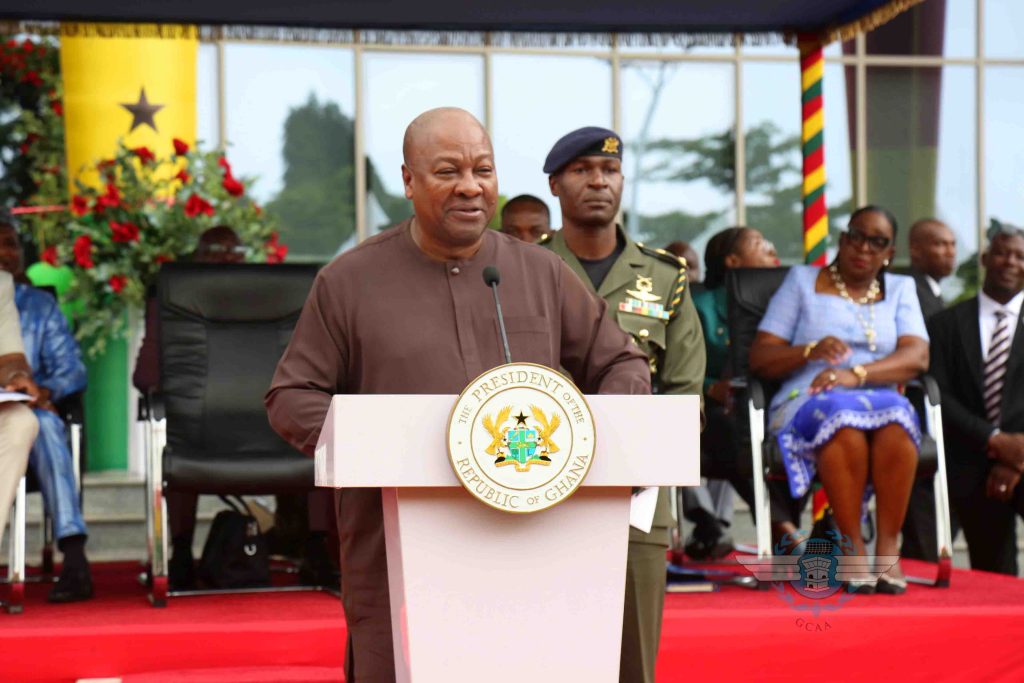President John Mahama Commissions GCAA’s New Aviation Navigation Centre and Border Security Systems
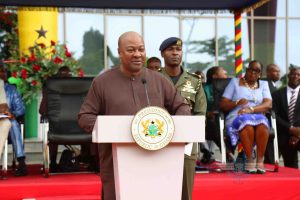
President John Dramani Mahama has commissioned the Ghana Civil Aviation Authority’s new Air Navigation Services (ANS) Complex and launched the Advance Passenger Information (API) and Passenger Name Record (PNR) systems.
The new complex will serve as the new headquarters for Air Navigation Services and be the nerve centre for Ghana’s air navigation operations.
It is where our skilled professionals—air traffic controllers, systems engineers, meteorological experts, and safety analysts—will be supervised and supported as they manage our airspace with round-the-clock precision.
The new building will host the API/PNR systems and serve as a central command centre for inter-agency collaboration among the National Intelligence Bureau (NIB), Narcotics Control Commission (NACOC), Ghana Immigration Service (GIS), Ghana Armed Forces (GAF), Ghana Police Service, Customs Division of the GRA, Ghana Fire Service, and several international partners.
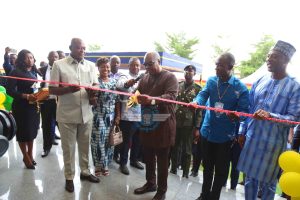
API/PNR Systems
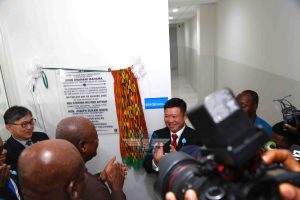
The API system provides border agencies with real-time information about passengers—who they are, where they are from, and where they are heading—before or during flights. Meanwhile, the PNR system gathers detailed data from booking records, offering deeper insights into travel plans for improved security and passenger service.
Together, the API and PNR systems enable the Ghana Civil Aviation Authority (GCAA) to identify potential threats before they reach the country’s airports, enhancing air safety and smarter border control.
These systems, already used worldwide, bring Ghana in line with international best practices and position the country as a secure, trusted aviation hub in West Africa.
Speaking at the inauguration ceremony, President Mahama noted that the project began exactly nine years ago. “It’s taken nine years, but we are proud to be here today.”
President Mahama described the event as a dual milestone for the aviation sector. “This is not just the unveiling of infrastructure. It signifies our commitment to transforming aviation in Ghana through strategic investment, digital innovation and global standards. It represents our determination to build a 21st-century aviation ecosystem anchored on safety, efficiency, collaboration, and service excellence,” he said.
He praised GCAA’s Acting Director-General, Rev. Stephen Wilfred Arthur, as a man of “wonders,” noting that by the end of next year, “we’ll be back to commission their new control tower.”
Aviation Safety and Global Connectivity
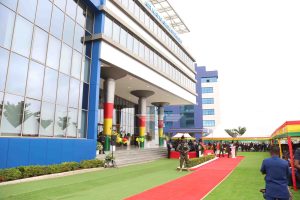
Highlighting Ghana’s reputation for aviation safety and security in the sub-region, the President attributed it to deliberate investments in regulation, training, infrastructure, and the professionalism of civil aviation personnel.
“This ultra-modern facility will now serve as the nerve centre for Ghana’s airspace management,” he said, outlining the systems housed within the complex: air traffic services and management, communication, navigation and surveillance systems, aeronautical information services, and meteorological services.
President Mahama emphasised that air navigation and safety oversight form the invisible but critical backbone of air travel. “If we are to become West Africa’s aviation hub, it’s not enough to build terminals and runways—we must invest in the systems that make air travel safe and efficient.”
He added that the API/PNR systems align Ghana with the United Nations Security Council Resolution 2178 and ICAO Annex 9, contributing to global counter-terrorism, border security, and safe mobility efforts.
“These systems will enable security agencies to collect and process passenger data in real-time, identify threats before arrival or departure, streamline immigration and customs, and enhance overall aviation security,” Mahama stated.
Vision for Digital Travel and Interconnectivity
The President directed the Ministers for Interior, Transport, and Foreign Affairs to expand the system’s integration to include e-visa services, land and sea border posts, and an advanced cargo information system for customs. “The e-visa system will reduce paperwork and bureaucracy, support tourism, and enhance Ghana’s attractiveness for business. The future of travel is digital, and Ghana must not be left behind,” he said.
He urged the GCAA to extend these systems to Terminal 2 at Kotoka International Airport, as well as the new Kumasi and Tamale international airports.
The president also mentioned plans for implementing e-gate systems to enhance passenger experience.
Mr Mahama commended the GCAA, Ministry of Transport, Ghana Airports Company Limited, security agencies, and international partners—particularly Excio of Japan and all consultants and contractors—for their role in delivering the project.
He reaffirmed his administration’s vision: “We want an aviation sector rooted in safety and technological excellence, supported by world-class infrastructure and skilled professionals, and driven by a strategy to connect Ghana to the world.”
“These are not just investments in concrete or code; they are investments in our national security, economic growth, and global connectivity,” he concluded.
Transport Minister: President Mahama’s Legacy in Aviation Unmatched
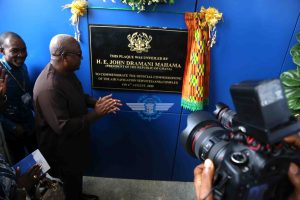
Also at the inauguration event was the Minister of Transport, Mr Joseph Bukari Nikpe, who praised President Mahama’s longstanding commitment to the aviation sector, describing his contributions as unparalleled.
He pointed out Mr Mahama’s role in initiating Terminal 3, the first phase of Kumasi Airport, Tamale Airport, and the Ho Airport, which is expected to become a pilot training academy.
“The commissioning of the ANS complex realises a vision the president started in October 2015. It also aligns with international best practices to separate air navigation services from regulatory functions,” the Minister noted.
He highlighted the importance of API/PNR systems in combating growing threats such as drug trafficking, terrorism, money laundering, and human trafficking. “These initiatives are not just about technology—they are about readiness, coordination, and progress,” he said.
The Minister called on GCAA staff to make the most of the new infrastructure, stressing its potential to solidify Ghana’s status as a true aviation hub in the sub-region.
GCAA Acting DG: Ghana Now Among Africa’s Aviation Leaders
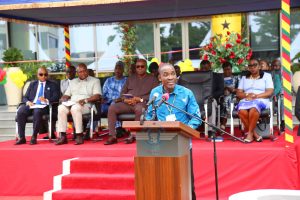
In his welcome address, Rev. Stephen Wilfred Arthur, Acting Director-General of the GCAA, expressed his heartfelt gratitude to President Mahama for appointing him to the position and praised his transformative and visionary leadership.
“This complex is one of the most advanced in Africa and the world, second only to South Africa in scale. It reinforces Ghana’s growing role in regional air navigation and safety,” he said.
Rev. Arthur underscored the significance of the ANS and PNR Centre as part of the broader effort to support a 24-hour economy and improve threat detection at borders.
Consultant: A National Security Milestone
For his part, Mr Francis Bullen Gavor, CEO of Rock Africa and consultant on the API/PNR project, called the launch “a milestone in aviation security and border control.”
He stressed the importance of replacing paper-based manifests with structured, real-time data.
“In 2024 alone, 3.2 million passengers passed through Kotoka. Among them were investors and tourists—but also individuals on international watchlists.”
He said today’s threats require today’s tools, highlighting that the API/PNR systems will ensure the country’s border agencies are equipped to handle them.
With Ghana’s economic recovery gaining momentum, Mr Gavor said, “Our ability to identify persons of concern before arrival or departure is not just useful—it is essential to national security.”
You may also like
-
PROCUREMENT ADVERT – SUPPLY, INSTALLATION AND COMMISSIONING OF SPACE-BASED ADS-B SYSTEM FOR GCAA
-
GCAA PRESS RELEASE – 29-10-2025
-
DIRECTOR-GENERAL BROKERS INTERNSHIP AND SECONDMENT DEAL WITH QATAR CIVIL AVIATION AUTHORITY
-
GCAA Grants Air Tanzania Air Operator Certificate
-
National Aviation Safety Coordination Group Launched to Ensure Effective State Safety Programme Implementation
